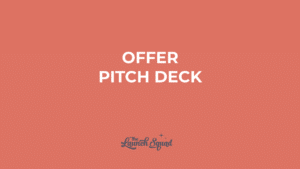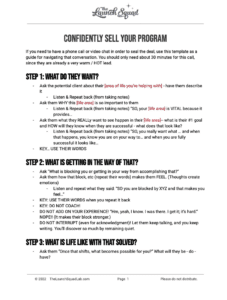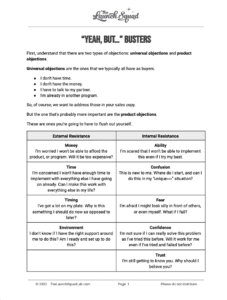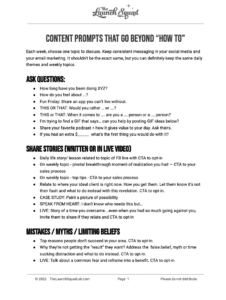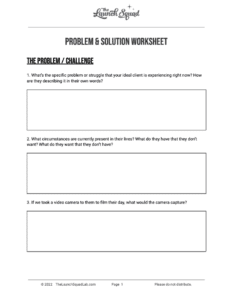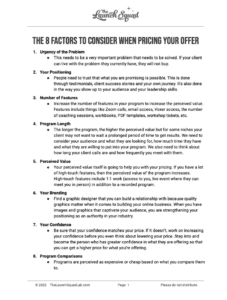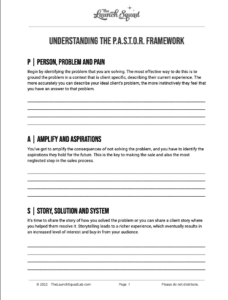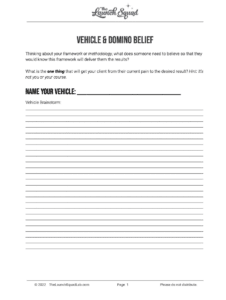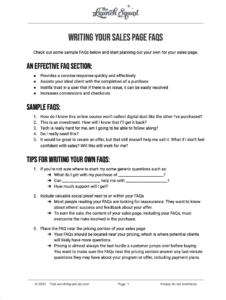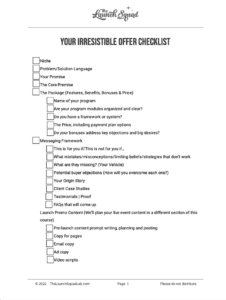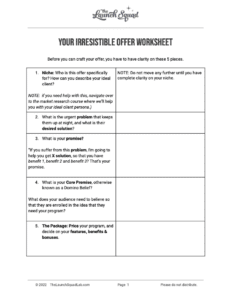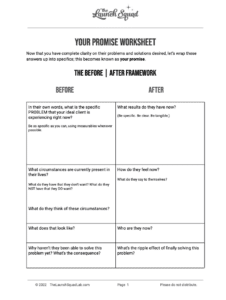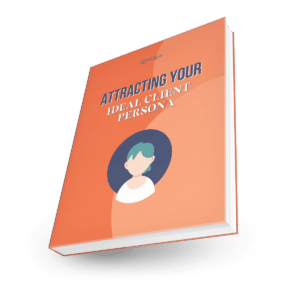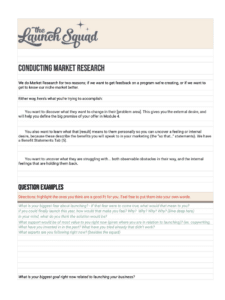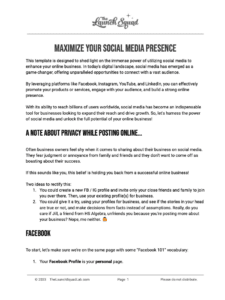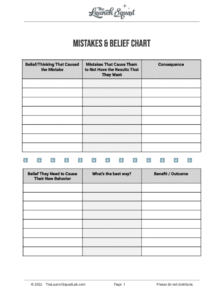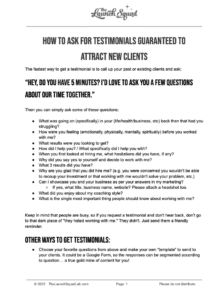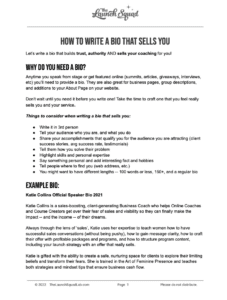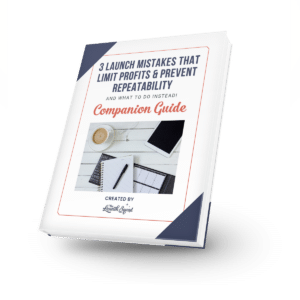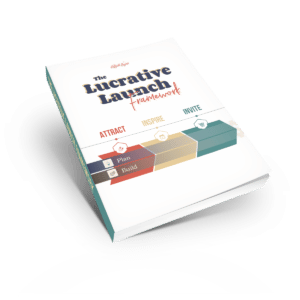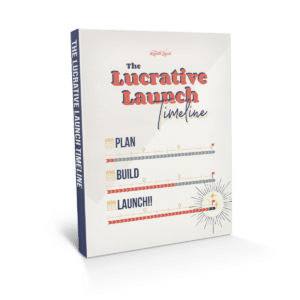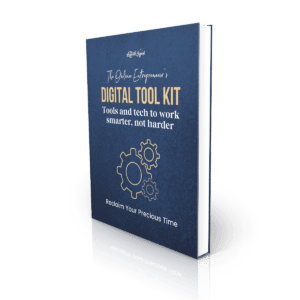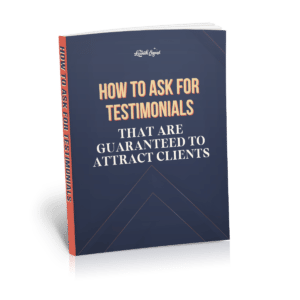Aleyah: Welcome to the light mere launch podcast. Today, we're talking about authentic branding. So stay tuned.
Announcer: Hey, we're in the Launch Squad and this is the Light Your Launch podcast. We teach coaches and course creators how to lighten their launches. We're bringing you all of the tips and strategies to take your launch from intimidating to money-making. In this podcast, we talk about everything; the sales, strategy, mindset, technical and spiritual aspects of running your best launch ever. So if you're feeling overwhelmed and unsure of the next right step, we're here to bring clarity, confidence, and excitement into your next launch. This is the Light Your Launch podcast.
Aleyah: Welcome back to the show. I'm Aaliyah Swan. And today I'm talking with Amy Green sky about how an authentic brand attracts your ideal client. Hi Amy. Hi, thanks so much for being here. I've been, so looking forward to this podcast with you. Yeah,
Amy: Me too. I'm happy to be here,
Aleyah: So I absolutely love your branding style and design style. It's you always know how to bring out somebody's essence in their brand. And I am excited to learn more about how you do that. What's your magic? How do you make that happen?
Amy: Yeah, well, um, really my branding philosophy is around authenticity. So, um, we start every branding process with a brand discovery session, which is where we do a deep dive into, um, really who you are as a person and a business owner. Um, we talk about what lights you up about the work that you're doing. We talk about who your ideal clients are and what you love about them. Um, and then, uh, I, I even asked a set of questions that I call my third grade getting to know you questions because on the surface they sound a little silly. It's like, what's your favorite animal? Or, you know, what's your, what's your favorite color? What's your favorite flower, but it's a bunch of little things that taken together, just it paints a picture of somebody's tastes and their style and it just it's who they are as a person.
Aleyah: I absolutely love that. And I've been through your branding intake, even though I'm still on your list of, of, uh, branding clients, um, on your waiting list. Yes. But just doing the intake was so fun. Yeah. It's a fun process. Yeah.
Amy: I love people. So it's really just like speed getting to know someone on a deeper level with just in one session. And I feel like it's so necessary. Um, I mean, if you're, if you're, um, a branding specialist and you're really working at coming up with something unique, um, that's truly authentic and really represents your client. I feel like that part of the process is absolutely necessary. There's no way to just, you know, ask a few basic marketing questions and then have at it, I think going deeper is really, it's really required to know the person.
Aleyah: So, yeah. And I guess that's what you do that I don't think everyone does because in marketing, I feel like a lot of times people have their vision of marketing and it's more about their style and what they want your stuff to look like. And I feel like the difference with you with you is that you really look deep into the soul of the person you're working with. And then the design is really about them. And I just love that. And even if people don't know, I mean, do people come to you and they, do they have an idea or are they just kind of open? Like how does that process start?
Amy: Usually they've either seen my work or they know someone who has worked with me before. It's mostly, you know, either referrals or they've, or they're sort of in this, like, um, in this field, in this industry of like coaches and, and, um, creatives and healers. And so, um, sometimes they'll come to me and say, Oh, I saw this person's website that you did. And I really love it. Um, I want something similar for myself. So I always start by saying, you know, your brand is going to be unique to you. And I honestly can't tell you what that's going to look like until we dive in. And I, and I get that essence of who you are. And sometimes too, it's, it's also sort of an intuitive process where I'll be talking to someone and obviously I'm asking them all these questions, but, um, as I'm getting to know them and I hear their voice and how they come across, um, I'm picking up on these really subtle cues that ends up getting incorporated into their branding.
Aleyah: And that's your magic. I think that's your magic is that you use your intuition or your branding process
Amy: And it's capturing their essence and their energy, and then portraying that on the site. Because the goal for me, the goal is always, um, if a client goes to your website, I just want it to be the next best thing to meeting you in person.
Aleyah: I love that. Yeah, it feels so personal. So if somebody didn't know what branding was and they were just coming to you as a newbie and wanting some branding and they said, you know, what exactly is a brand? We talk, what is it?
Amy: Yeah. So, I mean, it's basically just a combination of, uh, visuals and messaging that that will convey, um, like an entrepreneurs or a company's story or personality. So, um, it's, it's really just a way of communicating. It's saying something about you and it's giving others, uh, like a clear sense of who you are and what you're, um, it's, it's pretty easily done through messaging. I, I think personally, because it's a more direct way of communicating, but the, um, having your visual ban brand be spot on, I feel is almost more powerful just because, um, or it's equally as powerful, just because it sort of connects with people on a level that they're not even quite sure that they understand. It's like it's on a more emotional level. Like it's like they get a sense of something as opposed to just reading copy and intellectually understanding what you're saying.
Amy: So, I mean, people always think of logos as, as like branding. That's one of those key pieces that always comes to mind, but it's also, um, you know, the subtleties in your color palette or it's like different textures and, um, different patterns that evoke certain feelings, even, you know, the style of your photography. It's just like that overall look and feel, um, coupled with the language that you use in your messaging. And the key is to just keep it so consistent that your, your messaging is saying the same thing that your visual brand is saying, so that it's just representing you and that's it.
Aleyah: Art is connecting those two together.
Amy: Yeah. Yeah. I'm not even sure that I could fully explain how that happens. I think that's where the alchemy comes in. It's sort of this, it's, this you're distilling the essence of a person than a visual brand, so,
Aleyah: And why would somebody, um, what do you think is the value and having your branding done?
Amy: Yeah. Uh, I mean, I think there's a lot of value in this and especially in markets where there is a bit of saturation. I know, especially these days, a lot of coaches have gone online. And so it just feels like everybody has a website. Everybody has their, their brand or whatever they're doing. And I feel like when things are particularly, uh, crowded that having, having a really powerful brand is what helps you stand out. So even if the person next to you is offering something really similar, your ideal clients who are going to see the authentic you portrayed, they're going to relate the ones that are meant for you are going to recognize you. If you're putting yourself out there in a really clear, authentic way. So,
Aleyah: Yeah. So it brings that personal element, just like, like you said earlier as if you're meeting that person.
Amy: Yeah. I think it's, um, a lot of times with coaches, especially it's like their personality is really the differentiator. It's how you approach the things that you're teaching other people and the way that you work with people, it's like whether you create like a softer, safer space, or if you're sort of bold and you have height, energy, it's like when those things are coming across in your brand, the people who need, whatever magic you have to offer are going to see that and feel that for themselves, that they're the right fit for you.
Aleyah: That makes so much sense. Yeah.
Amy: Yeah. I sort of liken it to, um, it's almost like friendships and I don't know that everyone has necessarily had this experience, but, um, I personally was very, uh, sort of shy and reserved when I was younger and I didn't, I wasn't fully expressing like who I was outwardly to other people I would sort of hold back or I wouldn't, you know, voice my opinions about things. I would sort of like agree with other people more and try to dress to fit in. And, you know, it's like wanting to just blend in with everybody else. So I wasn't sticking out or it wasn't awkward or goofy. And during that time, it was like, even the friends that I was attracted to, To, we weren't necessarily a great fit. Like I, they didn't really get, yeah,
Amy: Me. I didn't really get them. It's like we were friends, but it was sort of this like, okay, yeah, you're fun to spend some time with, but it never felt like we had this like deeper connection or it never really felt right. And what I've noticed is like over the years, as I've just been like, Oh, forget it. I'm just going to be myself. And the All Corny sense of humor, you know, every part of me out on display. Um, and I realized that my friendships became closer. The people that I was sort of attracting to me, um, were more aligned with who I really was on at my core. And so my relationships became deeper. And then in my business too, it's like, they sort of started experimenting with this. Like I don't pretend to be this corporate buttoned down, you know, super serious person. Um, I love corny dad jokes and puns and Goat joy. This is on my desk. I mean, it's just, I've got crystals. I've got, you know, I I'm just me. And I realized that the more that I would put myself out there, my most authentic self that the clients that I was drawing to me were like these people who just get me, they get the work that I do. And it felt like I'm working with some of my best friends,
Aleyah: Which is so much easier than trying to please everyone and trying to please people that you don't even have a real connection with. It's like how many billions of people are on the planet? I mean, we can't please. All of those people. No, no, you really can't if you're working with
Amy: Yeah. And if you're working with people that don't really get it and you have to like oversell and explain it, I have found that the people that I have to really on what I do, because they don't immediately understand it or they don't feel that initial like, uh, hi, yes, this is my person connection. Those clients tend to be more demanding, less willing to pay your full rate. And it just isn't, it's just not a match. Like it doesn't feel aligned and it's not as fun. And as joyful as everyone just being a resounding yes. From the beginning and diving into the process together and, and just enjoying it and feeling like you're working with your friends every day.
Aleyah: Yeah. If we're, if we're, um, bringing in relationships that aren't really fulfilling, then we're taking up space, energetic space too. Right. So if your schedule is full of clients, that you're not even having a great experience working with, then you don't even have time for your, the clients that you would love to work with. So I always feel that way too, that if, you know, if you're not in alignment, just let it go. Like they'll find their person that is perfect for them. Just let it go. So then you have space in your life and in your schedule to even bring in the right client or relationship friendship. I mean, I guess that applies to everything. I mean, so true friendships, everything.
Amy: Absolutely. And it also affects the energy that you have around your work. So like when you're excited to come to work every day and you love your clients and they're excited to be working with you. And, um, it creates this feeling of like excitement. And I just, I feel like whatever that is, get sort of put out into the world and people can sense that it's like when you hop on a sales call, people can pick up on whether you are just burnt out and hate in your it's because it's a difficult relationship or they're not the right fit for you. And you're sort of like, Oh, this isn't a lot of fun and it doesn't feel super aligned. Um, just that little shift in dynamic makes a huge difference in how you show up to other people.
Aleyah: I love that. How do you encourage people to, um, or how do you, what's your process around really settling on a particular style for a client?
Amy: Yeah. So I like to keep my process sort of open and, um, I like it to sort of go with the flow. So sometimes clients come to me and they already have a really clear sense of self in their business. They, they have an idea of what that looks like, or they've got like a few different examples of the direction that they want to go in. And that's really helpful. I will still do the brand discovery session just to make sure that they're right about that, you know? And, um, sometimes I've offered people, some suggestions that were, it wasn't exactly what they thought it was going to be. And it ended up being more authentically aligned with them. And, and that was how we went. So it's almost like I, I had them show up wherever they are. If they have an existing brand, I'll assess what they, what they have, we'll talk about, what's working and what's not.
Amy: And then we'll go through the brand discovery and we'll explore a little bit and see if we need to make any adjustments. Um, and then really, it's just, I, what I'll typically do is by the time I've gone through the brand discovery, I'll sort of have a vision in mind for what it w what it might look like. And then I pull in visual inspiration from a bunch of different sources and just so we can make sure that we're on the same page and they can look at it. And, um, I basically will put in some tests for like, limits, like if they, so I really want modern and kind of spare, I'll put like really modern and spare in there. Like, there's like hardly anything it's so simple and super modern looking just to sort of test like, where's that range, you know? And it's, it's, it is sort of an intuitive process where it's like, okay, put this out here and test it. And then it's like, Nope, pull that back. That was a little too modern. And some of it is just us to understand each other's language. So when one person says modern, it means something completely different when another person says it, or somebody says, Oh, that makes so much sense. Like, what does that mean? You know? And so some of it is just me showing them things and finding out what they're trying to express as well. So I don't know if that completely answered your question.
Aleyah: Oh yeah, it did. That makes a lot of sense. So I like the idea of testing because yeah, somebodies mid-century modern might even look different. Like sometimes we think we know what something looks like, and it might be totally different to a designer and actual designer. And then how that plays out on a web design is so different than probably in a home space or,
Amy: Yeah. Yeah. It really is. And there's just varying degrees. It's like, somebody may want something that is, um, you know, like even craftsman style to keep them hints of craftsman style, or you can go all in where it looks like a Frank Lloyd Wright house, you know, so it's just, it's varying degrees. But, um, another thing I like to do too, is to give people something to look at, because a lot of times when you're trying to describe something, but you don't have it in front of you, it's really hard to know whether something feels right without actually looking at it. So a lot of times we'll get a direction that we want to start in and I'll, I'll mock up some, some, I, you know, some visuals for them to take a look at, we'll put together a brand board that has all the different pieces together.
Amy: And if it's not quite it, then we just, we talk about where we want to go from here. Like, does it need to be a little bit more edgy? Does it need to be more modern? And then we make adjustments. And my goal is always because centered around authenticity. My goal is that by the end of the process, we get to a place where my clients just absolutely love their brand and feel like they would couldn't improve upon it. So this is where we just allow for that process. Like I've had to kind of, you know, we've designed something and then we both realize it's not quite it. And we've had to go back to the drawing board and, and rework it. Um, but ultimately, I, I mean, I don't think I've ever had a time where I didn't, you know, eventually get there and just, yeah.
Aleyah: Yeah. Well, I've seen that firsthand that people are, it's like opening up a Christmas present. They're so excited to see their branding and they feel like you really got them. I've heard that from multiple people that they're just, they feel seen. Yeah.
Amy: The best compliment that I ever get is just when somebody says, Oh, I showed this to someone and they said, wow, like they captured you so perfectly.
Aleyah: That's on the best parts of them.
Amy: Yes, exactly.
Aleyah: Like all the pretty parts.
Amy: Yeah. I always end up being A bit of a cheerleader for my clients too, because I get people who are sort of reluctant to put themselves out there. And I think it's like once I've gone through the brand discovery, it's like, I just, I love my clients so much because I feel like I know all these little quirky things about them. And like, I, like, I just know them on this slightly deeper level. And, um, I just, it's funny at the end of every brand discovery session, I just feel like this sense of like affection towards them. Like I just sort of know them as a person more completely, and I really love people. So it just sort of, I don't know, it's almost like whatever is going to come through with that perspective. Um, it's like it's coming through, like this filter of me appreciating like all these different quirks and qualities that people have and then really comes through presenting it in the best light. Yeah. Thank you.
Aleyah: Yeah. It really looks that way. It's just beautiful. Your designs are so beautiful and approachable too at the same time, you know? Cause I, I don't know what your thought is on this, but there's some times where I've seen designs where they just don't have the personal element. They're perfect looking, but there's something missing and it doesn't feel approachable. And what I love about your staff is that because you've really got the human element of the coach or person that you're designing for, you really do feel like their personalities in there. And it feels like you do know them and you could approach them instead of it being like, Oh, they're too removed from my daily. Like my daily life is in a smell like your designs are messy. So I don't want to say, I don't want to say that. I don't know
Aleyah: Why, what I'm trying to say. Do you know what I mean?
Amy: I do. I think We do because, um, I used to design websites for like businesses, you know, like it would be like a company as opposed to a person. And I realized it wasn't nearly as fulfilling for me because designing for individuals Allows for that Humanness to come through. And really the, the goal of these, um, these like entrepreneurial brands is so that it creates a connection between my client and their ideal client. And I think that human connection is what's sometimes missing from a more corporate brand.
Aleyah: Yeah. It really is. Um, and how do you know? So let's say I had my branding done. How would I know that my branding was actually having an impact in my marketing and on my clients?
Amy: Yeah. I mean, a really great test is look at who is drawn to you. And if those clients are just, you're like, you're pinching yourself. There they're like the perfect clients. They don't question the value of the work that you're doing. They feel like you're like, they're friends of yours just coming to hang out and work with you. Then I think then I think your brand has done a good job. It's at least you're conveying enough of yourself that people recognize you and that the right people are coming to you. I think if you find yourself sort of struggling to get clients, um, or you feel like you have to like overexplain things, once you get them on a sales call, then there's something that's not coming through. When, whether that's through your visuals and through your, your messaging. I feel like they both have this sort of equal weight, but they both have to be aligned with each other.
Amy: Um, and I'll give an example. I actually, um, had a client who didn't really have a brand to speak of. And she just had like a single page website. Um, but she was really energetic and super expressive and she would get on these Facebook lives and she had, you know, amazing advice and she was a business coach and like, um, awesome, awesome, awesome. Like her, her, her brand on Facebook, like her presence was really energetic and amazing and had really great information. She knew her stuff. And then you would go like, Oh, I'm interested in working with her and you'd click over to her website. And it was kind of like those weren't like, there was this little bit of disconnect from how she was presenting herself in person or on Facebook life. And then you go to her site and you're just like, Oh, is this even like you kind of double check and make sure it's the same person,
Aleyah: How, wow. Yeah.
Amy: And so If it doesn't feel aligned, it just puts this little question Mark in there and it starts to diminish that sense of like, um, consistency, which, which like feeds into gaining trust. It's like people know who you are and what to expect. And that everywhere that they see you, they feel like, Oh, I recognize her. That's the same person. Her messaging is the same across every platform. Her visuals are the same across every platform. She looks professional. She looks like she's been around for a little while. And so a lot of those pieces are what will set you apart from someone who maybe they, they have kind of just put together a DIY website. They don't really have a brand to speak of. It's it's those, if all else is equal, those little differentiators are what's going to help. Somebody decide to go one direction or another, that makes them go in your direction.
Aleyah: Yes. So if you're, if it's inconsistent, then people have a question Mark, because they're not quite sure what, which is the real you. Yeah. I don't know what to expect. Well, it's like, if they're,
Amy: We're expecting one thing and they arrive there and they're like, Oh, that's not what I was expecting, but they're considering hiring you. Like, let's say as a, as a business coach. And they're like, so I think I know her, but am I going to get into this coaching program? And it's not going to be what I expect, because that was sort of the experience I've already had, like going to our website, you're thinking it's going to be one thing. And then you're like, Oh, okay. It's not that wasn't how she was presented. And so it's a small, it's, It's more on a subconscious level. I don't think people like consciously say that, but it's, it's something that you just sort of pick up on. It's like, Oh yeah. Like that, that feeling of consistency, it makes people just feel more comfortable with you and that they will, everything that's getting presented, what they expect is what they receive. So, yeah.
Aleyah: Would you say that that authenticity piece is more important than the perfection piece? Yeah. I think that, yeah,
Amy: That, I mean, I based my entire philosophy, branding and design and marketing philosophy around the authenticity piece. So of course I'm going to say, I think the authenticity piece is more important than literally anything else.
Aleyah: Yeah.
Amy: And I think that's, I think It's because, um, so I have a degree in marketing and the things that I learned, um, in college were interesting and very valid, but you sort of got a view behind the scenes of why, uh, certain choices are made and how, how they use marketing. And some of it was, I mean, to be honest, some of it felt a little bit manipulative. It's like, make somebody feel slightly inadequate. So they feel like they need to purchase this thing. Oh, yes. Feel better about themselves Or, yeah, it just felt gross. I Feel like I got this entire degree just to learn what, I don't know, Believable. And there were, there were good points To take away from it. I majored in marketing because, um, my intro to marketing class focused on psychology mostly. And I thought that was sort of fascinating. Like if I wasn't doing this, I could see myself being a psychologist. But, um, and so I was sort of drawn to it because of that. But then I started getting into these classes and I'm like, geez, touchy. It's like how to manipulate somebody into buying what you want them to buy. And, you know, it just feels gross to me. And I'm not that I'm just not that kind of person. I'm just very like, you know, people centered and sort of heart-centered, I'm a sensitive person. I don't appreciate stuff like that. And so this idea of just really putting yourself out there and just being you, um, you know, don't, don't have any fear around it. Just be proud and as dorky as you are, or as quirky, whatever it is that makes you, you, I have such a fine appreciation for people who are honest and who are able to just be themselves. Um, whatever that looks like. It almost doesn't matter if you're like a deep human being and the work that you're doing, um, you have great intentions around it. Then I think that shines through, and those are the types of people that others really want to work with. And yeah, more to that point, it's the people that are meant to work with. You will recognize you in that crowded m ce.
Aleyah: Yes. And so you're attracting your people that like you were talking about earlier that feel really good to work with. Yeah. Well, I love that you come from that perspective, but I also love, cause you've mentioned a couple of times in conversations that you are aware in your visual design of where the eye goes first and you know, like some little kind of insider, not manipulations, but strap on it, the strategy. Yeah. So when you are working on someone's sales page or something, you can, you have some strategic pieces that are so smart that, you know, if you're DIY in your own site, you're not going to know that.
Amy: Yeah. It's actually a really specific perspective that I take when I'm designing a website layout as well, because that's also what I do. I'm not just a branding person. We also do, um, website design and development as part of our offerings. And so, um, what's interesting is it's almost like everything that I do, whether it's branding or websites, I approach it from your client's perspective. So I'm actually looking at your website as if I'm a client that just landed on the page because I've seen so many sites where it's like, they have a beautifully designed website, they spent a fortune on it. They had hired a professional copywriter and you like land on their website. And you're just like, Oh wow. This is like, interesting copy. But like initially you can't quite figure out what it is that they do. Like they're, they're almost like explaining it too quickly instead of just saying, Hey, like that initial, like I'm, I'm constantly just like, how can you best explain exactly what you do? And we're slapping that on your homepage banner right at the top. So like you're saying, I'm literally a coach who works with whoever, whoever, or, you know, I'm, I do like energy healing work or I do like, but it's sometimes you start to read like, Hey, I'm so-and-so and I love this and that and the other, and they're going through all their qualifications and you're just like, that's cool, but I'm not even sure. So it's just, It's looking at it from this perspective of like, I don't know who this person is, what am I seeing first? And then it's, um, really just, I ask my clients, if somebody arrives on your site and they have 10 seconds to do one thing before their power goes out, um, what would you have them do first? So usually it's like opting in to their free gift so that they are building their email list, you know? And then it's like, what's the benefit. They got 30 seconds. Then what's the next thing that you want them to do. And that could be, you know, you want them to schedule a call or you want them to learn more and there's, but really all it is is setting up a website so that it feels intuitive to the viewer so that they know exactly where to go next.
Amy: I like a lot of white space things to be really clear. And you can also design it in a way that your graphics and your branding elements are sort of leading them through the site. So it's like visual interest and there is a technique it's kind of funny. It's like a zigzag where like your eye is naturally going to start in the upper left-hand corner, then it's going to zag. Right. And it's going to go left again and kind of work its way down the page that way. So if you're strategic and you have, um, interesting and different sort of visual elements, it'll sort of peak their curiosity and keep them moving down the page so that they're more inclined to read your copy instead of it just being sort of, you know, a little overly simple, or it doesn't have, um, unique elements. And they're just like, okay, here's just a whole bunch of copy that I have to work my way through. So just looking at it from the, the visitor's experience, you can get a sense of how it feels to be on the site.
Aleyah: Yeah. I love that. I love that. You know how to do that. It's not sleazy. It's very effective. It's helpful. It helps people. Yeah.
Amy: And it doesn't have to be super complicated. It's just, it's just making it easy for your client to go where you want them to go. You know, it's, it's not like you're, you're trying to get them to do something. It's more just like, make it easy for them. Like if they want to hire you, don't put up barriers in their way or make them smile through a huge amount of copy to even understand, you know, what you have to offer. So
Aleyah: They feel that way. They feel easy. They feel so friendly, so comfortable and intuitive. And I just am so glad that there's people out there branding and marketing and design people like you, who are bringing more authentic, um, you know, uh, designs into the online presence of all these sweet heart-centered people that you work with.
Amy: Yeah, exactly. I think it's so needed. Um, in this space, you know, it's, there are a lot of people that, that are wanting to run businesses and they're really passion driven. Like they're businesses, they're, they're out there to do really great things in the world and help other people. And you know, like I always say, I love working with the teachers and the helpers and the healers and the people that are out to do really good things because personally that's what lights me up about the work that I'm doing is working with entrepreneurs that are, that are out there trying to make a difference in the world. So it keeps me excited about my project.
Aleyah: Amen. Okay. Before we go, I want to hear your goat that you have on your desk.
Amy: Oh yeah. Okay. So my son, my son, who's 10 got me this for Christmas
Aleyah: And I know you love goats.
Amy: It's called A screaming goat and it's this little plastic coat that sits on my desk and he screams. So I'll, this can be our outro.
Aleyah: Okay.
Aleyah: Yay. Thank you, Amy Green sky.
Aleyah: Absolutely. It was my pleasure. It was great talking with you.
Aleyah: You too. Thanks for joining us. If you enjoyed this episode, please leave a five star review and hit the subscribe button. You can check out the show [email protected] forward slash episode 14.
Announcer: Hey, thanks for listening. If you'd like to have clarity, confidence and excitement around your next launch, join us in the Lighten Your Launch Facebook group today at thelaunchsquadlab.com/facebook. We also invite you to download our free gift, the Lighten Your Launch starter kit, the free guide to creating an irresistible offer, pricing it right, overcoming tech barriers, and tapping into the energy you need for success. Get it now at thelaunchsquadlab.com/freegift.
Be the first to know
Enter your name and email and we'll let you know when new episodes release.
About the Show
The Lighten Your Launch Podcast is for Coaches and Course Creators who want a lighter online launch experience. Maybe you’ve done a few launches already, and feel exhausted just thinking about it! Or, it’s been one of your goals, but you don’t know where to start.
Tune in to learn from our team of experts, The Launch Squad, who aren’t afraid to dig into all aspects of launching: sales, strategy, technology, mindset, funnels, and even a bit of woo to get you through the toughest times. Let’s put a stop to perfectionism and procrastination, and finally take your launch from intimidating to money-making!

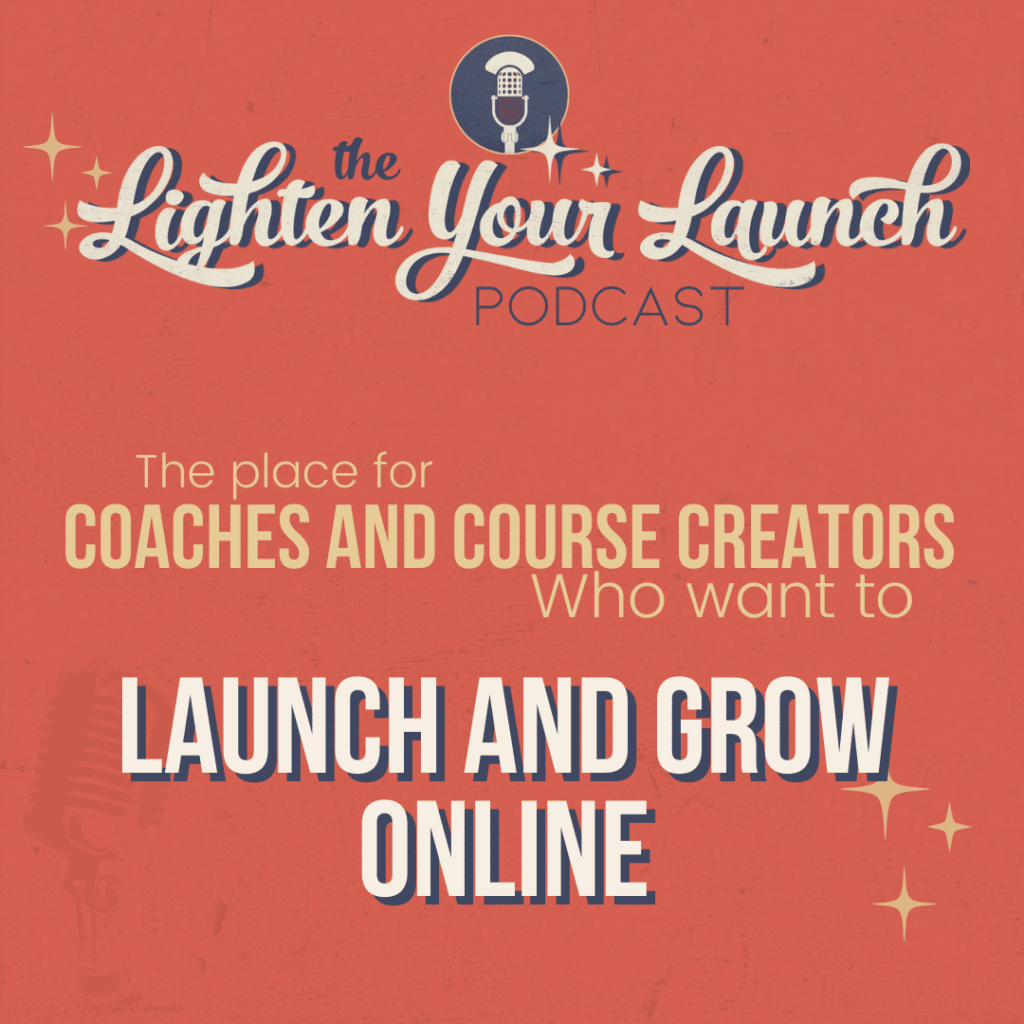
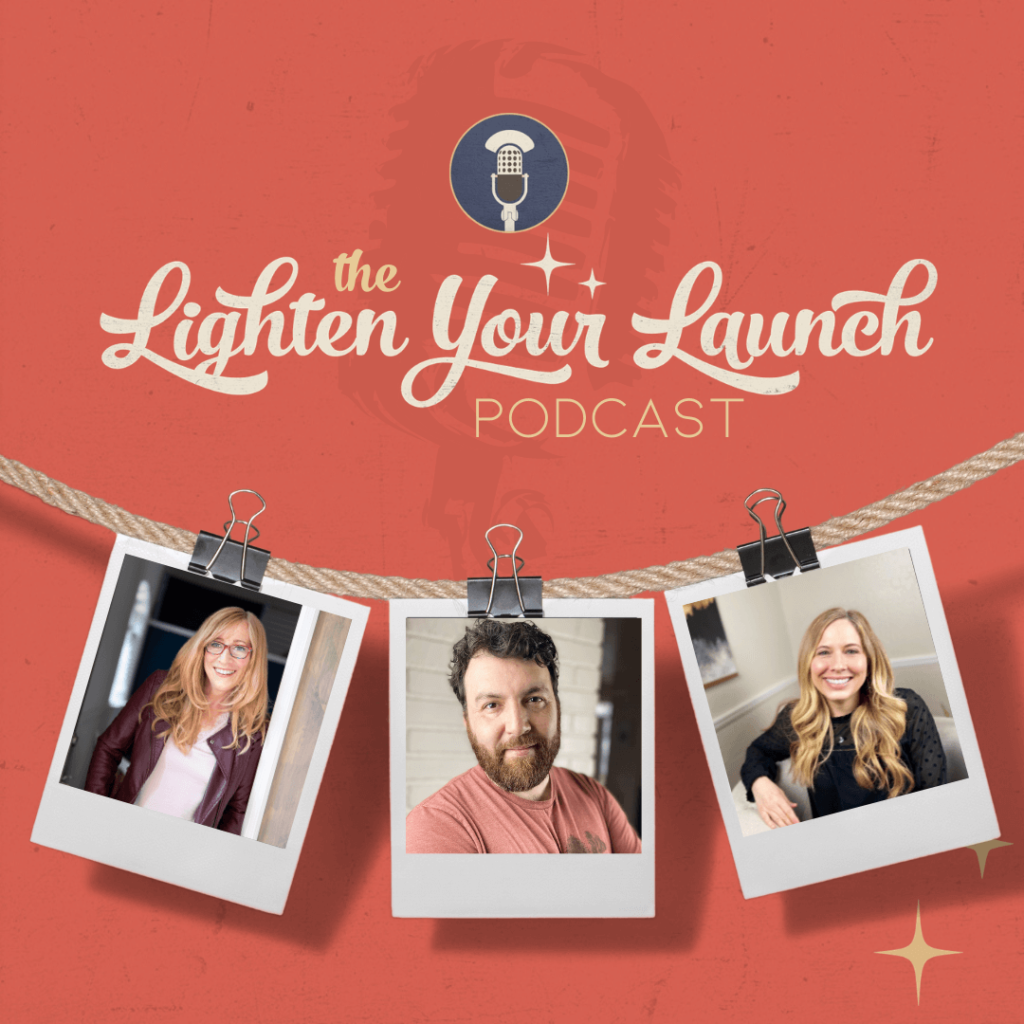


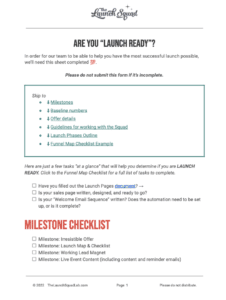
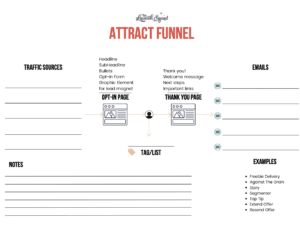
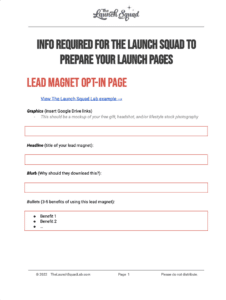
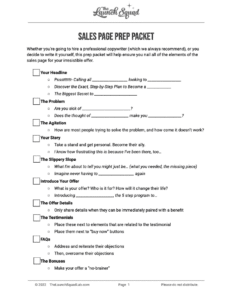
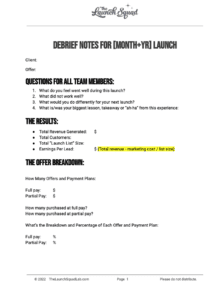
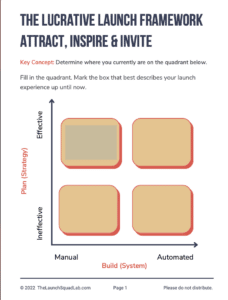
![Marketing Launch Calendar [TEMPLATE]](https://thelaunchsquadlab.com/wp-content/uploads/2023/05/Marketing-Launch-Calendar-TEMPLATE-300x260.png)
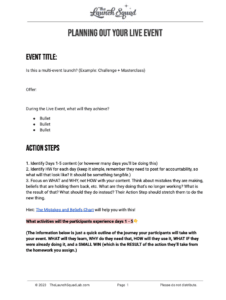
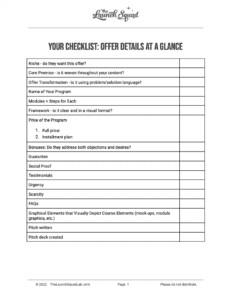
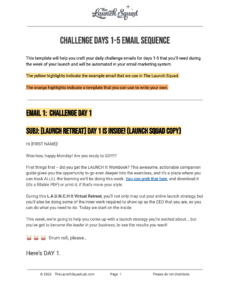
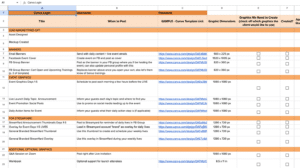
![[Updated] Email Templates for Launch](https://thelaunchsquadlab.com/wp-content/uploads/2023/05/Updated-Email-Templates-for-Launch-223x300.png)
![[REVISED] LS Pitch Script](https://thelaunchsquadlab.com/wp-content/uploads/2023/05/REVISED-LS-Pitch-Script-2023-226x300.png)
